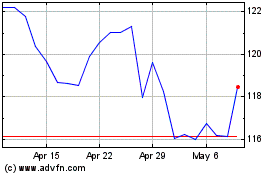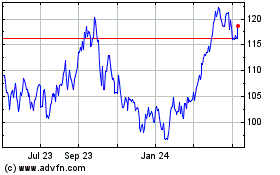Exxon Wins Rare Reprieve From U.S. Sanctions Fine
January 02 2020 - 7:10PM
Dow Jones News
By Dylan Tokar
Exxon Mobil Corp. won't have to pay a fine for continuing to do
business with a Russian state-run oil company amid increasing U.S.
sanctions on the country, a federal judge ruled.
The U.S. District Judge Jane Boyle's ruling this week voids a $2
million fine the U.S. Treasury Department imposed on the Irving,
Texas-based oil giant in July 2018 for allegedly violating U.S.
sanctions on Russia when it entered into contracts with Russian oil
firm PAO Rosneft.
"ExxonMobil acknowledges the court's decision, which confirms we
complied with the applicable sanction," a company spokesman said in
a statement.
Exxon was fined for executing contracts with state-run Rosneft
after President Barack Obama issued sanctions against Russia for
annexing Ukraine's Crimea region. Even though Rosneft wasn't added
to the U.S. sanctions list, the contracts were signed by the
company's chief executive, Igor Sechin, who was.
Exxon in 2018 said it was abandoning its venture with Rosneft
after failing to secure a waiver from President Donald Trump to
drill with the company in several areas banned under U.S.
sanctions. But the company continued to fight the fine imposed by
the Treasury's Office of Foreign Assets Control.
The lawsuit was seen by some sanctions lawyers as an opportunity
to clarify an ambiguity about how OFAC enforces sanctions against
blacklisted individuals with ties to nonblacklisted companies.
The agency has since released additional guidance on the issue,
cautioning companies against entering into contracts signed by
blacklisted individuals. The guidance was issued after Exxon and
Mr. Sechin signed the contracts.
In its lawsuit, Exxon pointed to a press release and public
statements by White House officials, saying that the focus of the
sanctions was on blacklisted individuals' personal assets, rather
than on any companies they managed on behalf of the Russian
government.
Judge Boyle on Tuesday admonished Exxon for not seeking further
guidance from OFAC -- which is tasked with interpreting and
enforcing the executive branch's sanctions orders -- at the time of
the contracts, calling the company's decision risky and possibly
imprudent.
The judge, however, said OFAC ultimately failed to give the
company fair notice of its interpretation of the Ukraine sanctions,
a violation of the due process clause of the Fifth Amendment.
A Treasury spokeswoman declined to comment on the ruling.
OFAC had argued that the plain language of the executive
branch's sanctions orders was enough to give Exxon fair notice. At
issue in particular was whether Mr. Sechin's signing of the
contracts constituted a service.
The signing could be considered a service, Judge Boyle said,
given that it was performed in Rosneft's interest. But the text of
the Obama administration's executive order didn't give Exxon fair
notice that the receipt of such a service would violate U.S.
sanctions, according to the judge.
The ruling is a rare win by a company against the U.S.
government's sanctions enforcer, which has broad authority to
enforce U.S. foreign policy.
Write to Dylan Tokar at dylan.tokar@wsj.com
(END) Dow Jones Newswires
January 02, 2020 18:55 ET (23:55 GMT)
Copyright (c) 2020 Dow Jones & Company, Inc.
Exxon Mobil (NYSE:XOM)
Historical Stock Chart
From Mar 2024 to Apr 2024

Exxon Mobil (NYSE:XOM)
Historical Stock Chart
From Apr 2023 to Apr 2024
